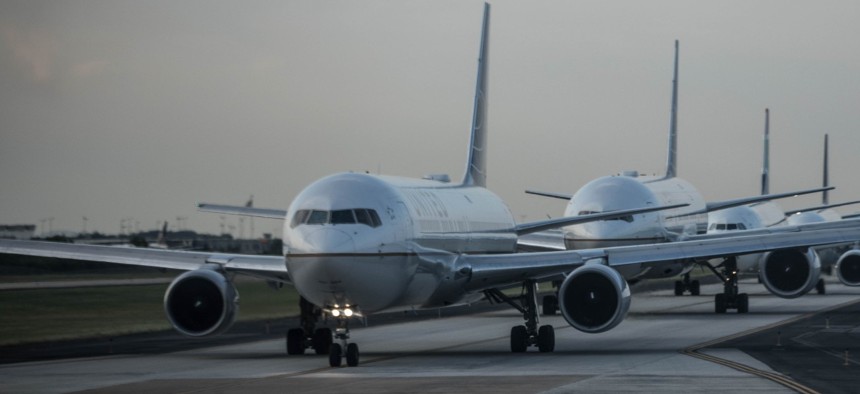
Planes taxi at Dulles International Airport in Virginia. By fivetonine / Shutterstock.com
Air Marshals Are Increasingly Complaining of 'Extreme Fatigue'
On-the-job injuries and illnesses have skyrocketed in recent years for the TSA employees.
Unpredictable scheduling and shifts sometimes lasting 20 or more hours have left Federal Air Marshal Service employees suffering from extreme fatigue, mental illness and other medical conditions, according to a new study, which found the agency is not taking appropriate steps to address the problem.
In discussing workplace issues with Air Marshals in six offices across the country, the Government Accountability Office found in every case the law enforcement employees raised concerns about their health and safety. Sleep deprivation was a frequently mentioned complaint among the air marshal employees, who fall under the jurisdiction of the Transportation Security Administration.
Under Air Marshal Service guidelines, marshals are slated to work no more than 10-hour shifts on domestic flights followed by at least 12 hours of rest. Many international flights do not have a shift cap, but can require up to 24 hours of rest. The agency can ignore its caps if it is deemed an operational necessity, however, and the marshals spent more than 10 hours on their shifts for domestic flights in 13% of workdays per 28-day period. International flight shifts exceeded 18 hours for one-in-four flights per 28 days, and lasted longer than 20 hours in 11% of shifts.
GAO said the Air Marshal Service has failed to keep track of how often its employees were exceeding work caps or not receiving required rest.
“[Air Marshals] management is not well positioned to determine if scheduling guidelines are serving their purpose to balance air marshals’ quality of life with [the service's] operational needs to execute its mission, nor can it determine the extent to which air marshals are working beyond the guidelines,” GAO said. “As a result, the agency may not be able to successfully manage risks of potentially decreased alertness and focus when air marshals perform their duties.”
Many air marshals were not aware of the shift caps, GAO found, and the Federal Air Marshal Service agreed to make that information available to them. The employees are expected to remain available 24 hours a day and frequently get called into work or have their schedules adjusted with little notice. In addition to “extreme fatigue,” employees reported difficultly in sustaining social lives, obtaining child care and maintaining healthy diets.
FAMS cut its workforce by 17% between 2013 and 2018, but workers’ compensation claims spiked by nearly 300% in that same period. Thirteen employees died between 2013 and 2019, including five suicides and one death during a flight.
The agency began monitoring the spike in on-the-job injuries in 2016 and hired a safety specialist to address the issue in 2019. It has failed to gather comprehensive data on the health of its workforce, however, leaving it unprepared to deal with widespread issues. Employees are required to take occasional medical and fitness tests, but GAO said FAMS does not make use of the data it collects.
“Without information on the overall health and fitness of the FAMS workforce,” GAO said, “FAMS management is not well positioned to prioritize employee health and welfare or ensure that it deploys a workforce capable of fulfilling its national security mission.”
The Air Marshal Service agreed to collect more information and analyze the health data of its employees. It told GAO it has already created a working group to address health concerns, but failed to provide any documentation for the group or detail any timeframe for its meetings or actions. Still, the auditors called it a positive first step, also praising the increased use of standby work hours for employees to build more predictability into their schedules.







